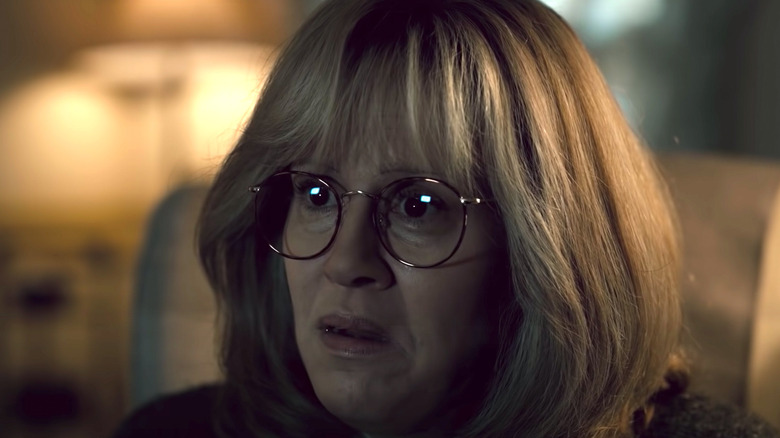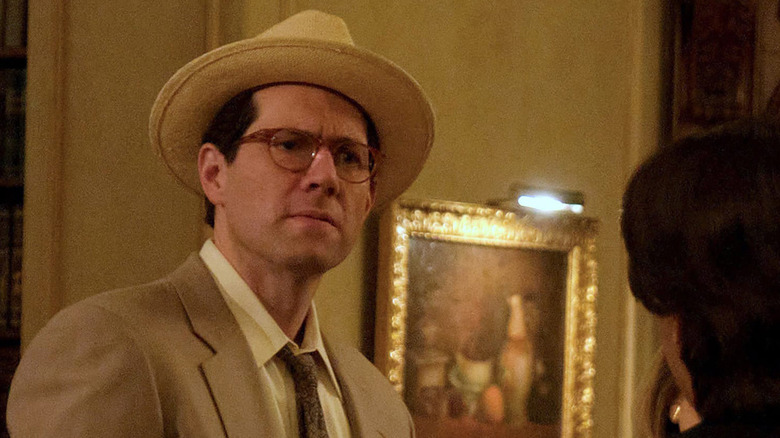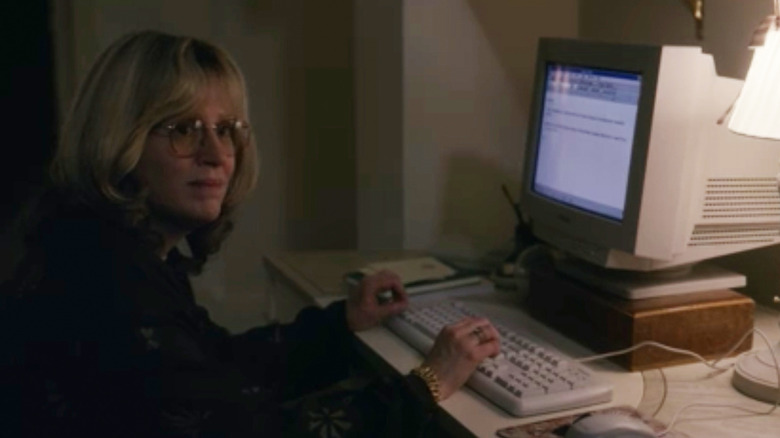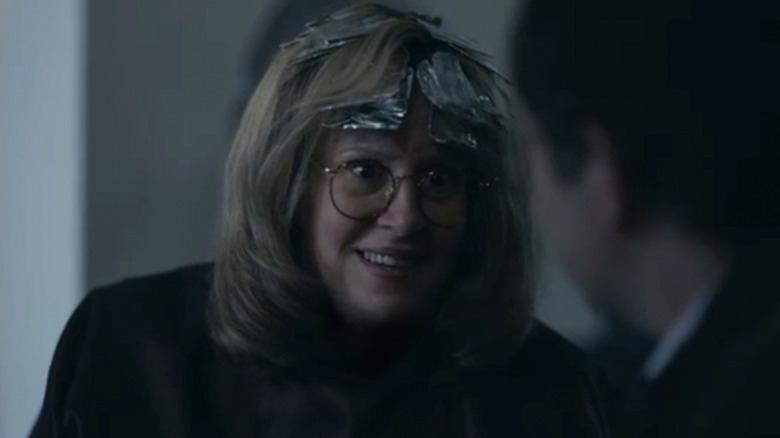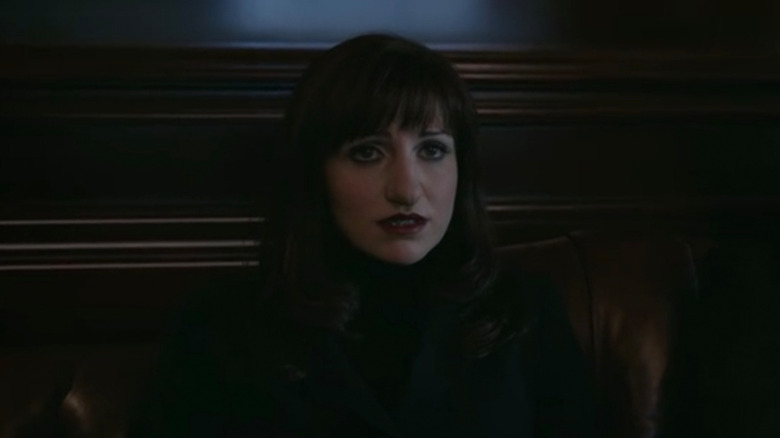How Accurate Is Impeachment: American Crime Story Episode 3?
"Impeachment: American Crime Story" is the latest season of Ryan Murphy's FX anthology series that dramatizes a scandal most Americans of a certain age remember all too well: the Bill Clinton impeachment trial, which stemmed from his affair with White House intern Monica Lewinsky. The show explores the motivations and backstories of several major players involved in the scandal, including Lewinsky herself (Beanie Feldstein) and her confidant and ultimate betrayer Linda Tripp (Sarah Paulson). It also explores the former president's other alleged misdeeds, like his alleged sexual assault of Paula Jones (Annaleigh Ashford) and her subsequent lawsuit, and Kathleen Willey's (Elizabeth Reaser) allegation that he sexually harassed her.
As with any series that dramatizes real-life events, some of "Impeachment: American Crime Story" is fictionalized. But many of the show's moments, including the most salacious, did happen almost exactly as the show portrays them. That's in part because Lewinsky herself served as a producer on this season.
Episode 3, "Not to Be Believed," aired on September 21, 2021. It starts off by telling the origin story of internet journalist and Drudge Report founder Matt Drudge (Billy Eichner), who goes on to scoop Newsweek reporter Michael Isikoff's (Danny Jacobs) story about Willey's accusation against Clinton. Meanwhile, Clinton (Clive Owen) breaks up with Lewinsky, Tripp finally sees her name in print, and Jones rejects the president's offer of a financial settlement.
Matt Drudge: mostly accurate
When the episode begins, Matt Drudge is working at a CBS Studios gift shop in Los Angeles by day, and by night he's publishing his online newsletter, "The Drudge Report." After digging through the trash, he finds proof that NBC is going to offer Jerry Seinfeld $1 million per episode, making him the highest-paid TV actor at the time.
This story helps Drudge become a major force in online journalism. Two years later, Drudge has insinuated himself into the Washington, D.C., media industry. At a party for conservative lawyers, Drudge discovers that Michael Isikoff is working on the Kathleen Willey story. Drudge publishes his own account of the story first. This pressures Isikoff to publish his article soon, and he begs Linda Tripp to go on the record about her recollections of the incident. Tripp does, and Newsweek publishes it.
The detail about Matt Drudge's day job at a gift shop is indeed true — although he reportedly got the Seinfeld scoop after overhearing gossip on a soundstage. Drudge's journalism did indeed pressure Isikoff to publish his story earlier, although Drudge had written multiple articles about the Kathleen Willey article, and not just one (via Vulture).
The letter to Clinton: inaccurate
After President Clinton breaks up with Monica Lewinsky, she is at first inclined to move on, until Linda Tripp reminds her about the many ways Clinton has hurt her. Tripp emphasizes that the affair with Clinton has had disastrous consequences for Lewinsky professionally, so she should take action. Tripp then helps Lewinsky write a letter demanding that Clinton rectify the situation, and does several edits to make the language more forceful. After receiving the letter, Clinton promises to help Lewinsky find a job.
Per Vulture, Lewinsky really did write this letter, but according to Madeline Kaplan, who worked as a researcher for the Clinton-Lewinsky season of Slate's "Slow Burn" podcast, there's no evidence that Tripp helped the former White House intern compose it. Later taped conversations between Lewinsky and Tripp did reveal that Tripp helped Lewinsky write other letters, but just not this one.
The hair salon meeting: accurate
When Michael Isikoff begins to pressure Linda Tripp to finally go public with her recollection of Kathleen Willey's accusations, Tripp makes the journalist jump through several hoops to get what he wants. She forbids him from calling her work phone, and she insists that when he contacts her, he use the name "Harvey." When Tripp finally agrees to meet Isikoff and give an on-the-record quote, she gives him the address to a hair salon and tells him to meet her there. Isikoff arrives to find Tripp getting her hair done, and she gives him the quote. Afterward, a Washington Post reporter bumps into them both. Tripp explains that she's Isikoff's cousin.
All of this happened almost exactly as "Impeachment: American Crime Story" portrays it. Tripp recounted the hair salon meeting to The Washington Post in 1998, although the Post didn't specify who the reporter was. And yes, Tripp really did make Isikoff call himself "Harvey." This detail was also noted by the publication in 1997.
Paula Jones refusing to settle: accurate
When the Supreme Court rules that Paula Jones can indeed sue a sitting president, Clinton reluctantly agrees to settle, and he offers the Joneses $700,000. However, her husband Steve (Taran Killam) is growing increasingly furious about the scandal and doubts what really happened in her hotel room. When the Joneses arrive at the law firm, their spokesperson, Susan Carpenter-McMillan (Judith Light) takes Steve aside and subtly encourages him not to accept. Paula considers accepting the settlement before Steve and Carpenter-McMillan talk her out of it.
According to "Slow Burn" researcher Madeline Kaplan, this is an accurate characterization of Paula Jones' decision to reject the settlement. Jones later said that she wanted to accept the offer but was manipulated out of it (via Vulture). In 1997, Jeffrey Toobin wrote in The New Yorker that it was Paula's decision to reject the deal, although he also reported that Steve pressured her into it. However, the degree to which Carpenter-McMillan talked Steve into manipulating Paula is unknown.
If you or anyone you know has been a victim of sexual assault, help is available. Visit the Rape, Abuse & Incest National Network website or contact RAINN's National Helpline at 1-800-656-HOPE (4673).
